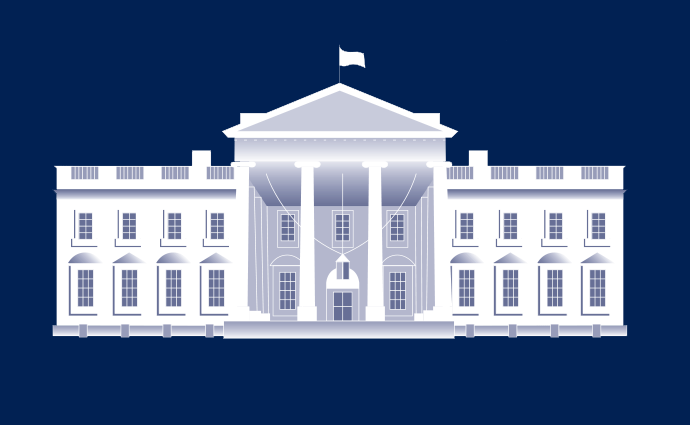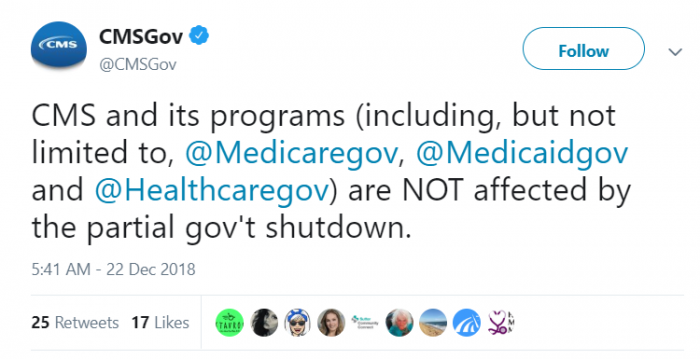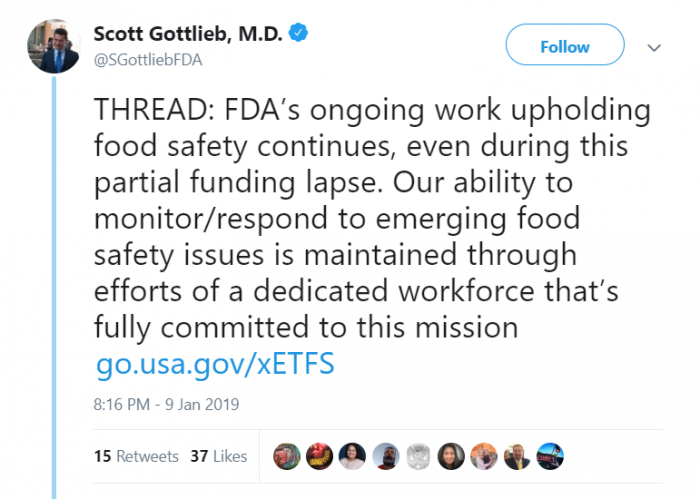Government Shutdown Spares Medicare, Medicaid, But Has Other Impacts
The partial government shutdown is not affecting Medicare and Medicaid, but other health-related services are feeling the pinch.

Source: Thinkstock
- The partial government shutdown will have no impact on Medicare and Medicaid at the federal level, CMS has stressed to industry observers.
The nation’s public payers will continue to operate as normal, since funding for CMS is assured until at least September 30, 2019.
“CMS and its programs (including, but not limited to, @Medicaregov, @Medicaidgov and @Healthcaregov) are NOT affected by the partial gov't shutdown,” CMS stated on Twitter after the partial shutdown began in late December.
Federal workers in departments without funding are also assured of health insurance coverage during for the duration of the shutdown, the Office of Personnel Management (OPM) stated in an FAQ.
“The employee’s Federal Employee Health Benefits (FEHB) coverage will continue even if an agency does not make the premium payments on time,” the agency said. “Since the employee will be in a non-pay status, the enrollee share of the FEHB premium will accumulate and be withheld from pay upon return to pay status.”
READ MORE: Verma: Price Transparency Rule a “First Step” for Consumerism
Beneficiaries will not have the option to terminate or cancel their coverage, OPM added. New enrollments or changes in enrollment status will not take effect until the employee has reentered paid status.

Source: Twitter
However, the ripple effects of the standoff over the federal budget are being felt elsewhere in the healthcare industry.
“Even though HHS has appropriations through September 30, funding for some of its agencies, notably the Indian Health Service (IHS) and the Food and Drug Administration (FDA), comes from appropriations bills for departments that are currently unfunded (Interior and Agriculture),” explained Andy Schneider, Research Professor of the Practice at the Georgetown University McCourt School of Public Policy.
“HHS’s plan for dealing with these shortfalls is to furlough 24% of its employees. In the case of the IHS, the agency can continue to staff and operate its hospitals and clinics but it is no longer able to provide the majority of funds for Tribes and Urban Indian Programs to operate their own facilities.”
Many Indian Health Service workers are continuing to provide care to Native populations despite not getting paid, according to the Huffington Post. But health system staff may not be able to continue to keep the doors open for long.
READ MORE: DOJ Recovers $2.5B in Healthcare Fraud, False Claims in 2018
“Generally, the public probably perceives physicians won’t suffer. But we have young people just out of residency, with big student loans ― they’ll have to make deferrals on those,” said r. James McAuley, the clinical director of Whiteriver Indian Hospital in Arizona.
“More worrisome is what happens with support staff, who are making far less and supporting family members.”
The shutdown may also affect certain court cases being argued by the Department of Justice, including a case related to a Department of Labor ruling aimed at expanding the availability of association health plans (AHPs) as well separate cases focused on the ongoing legal wrangling over aspects of the Affordable Care Act.
"DOJ’s Contingency Plan for a lapse in appropriations in FY2019 states that civil litigation 'will be curtailed or postponed to the extent that this can be done without compromising to a significant degree the safety of human life or the protection of property,'" stated Schneider.
"DOJ litigators will request that active cases that meet this test be postponed until the agency is funded. Judges will then decide whether to grant or deny the request; if the request for postponement is denied, DOJ will continue to litigate."
READ MORE: Hospital Price Transparency Rule Takes Effect January 1, 2019
In addition, the FDA’s funding for routine food inspections has been suspended, leaving the nation vulnerable to outbreaks of food-borne illnesses.
FDA Commissioner Dr. Scott Gottlieb has stressed on Twitter that the FDA is working to continue to conduct high-risk food facilities, which comprise around 30 percent of domestic inspections. The agency is also continuing to inspect all foreign foods.

Source: Twitter
A number of FDA food inspectors are currently working without pay, and many domestic products are currently not being inspected.
“FDA’s professional staff remain fully dedicated to our mission,” Gottlieb wrote on January 9. “We’re taking whatever steps we can to support our colleagues as they fulfill our commitments to the American people under challenging circumstances.”
As the shutdown drags on and federal employees burn through their credit and savings, there may be a spike in individuals seeking care at emergency rooms, which do not turn patients away based on ability to pay.
Individuals may also delay routine care for chronic diseases if they are unable to meet their out-of-pocket financial obligations without a paycheck.
For payers, the aftermath of the shutdown could be expensive down the line, despite the fact that the immediate impacts are limited. With no end to the standoff in sight, payers will simply have to wait for the resumption of business as usual and tally the cost afterwards.
Update 1/18/2019: Blue Cross Blue Shield Association (BCBSA) Senior Vice President of Government Programs William A. Breskin has issued a statement on the continuing shutdown:
“Health care coverage for members of the Blue Cross Blue Shield Federal Employee Program® (FEP®) remains in place and active during the government shutdown. The BCBS Federal Employee Program continues to process claims and reimburse doctors, hospitals, and other health care providers. Eligible FEP members can also contact their local Blue Cross and Blue Shield company if they have a Qualifying Life Event, such as the birth of a baby, that allows them to change their coverage or add eligible individuals to their policy."
"We remain committed to the health and wellbeing of our members and want them to know that they will continue to have full access to their health care coverage during this time.”
